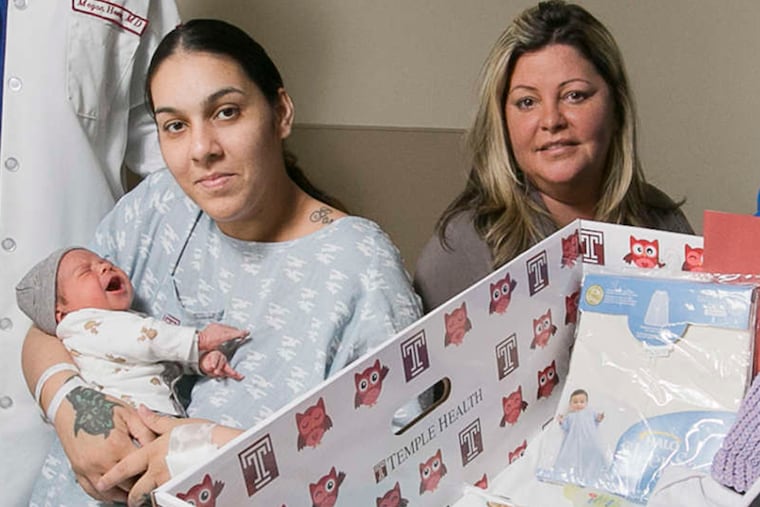Baby boxes give Temple newborns a safe start
At Temple University Hospital on Thursday morning, Naomi Stevens, all 6 pounds, 9 ounces of her, was resting up for the big day ahead.

At Temple University Hospital on Thursday morning, Naomi Stevens, all 6 pounds, 9 ounces of her, was resting up for the big day ahead.
Born two days before, Naomi was going home that day with her mom, Aracely Castro, 22, to West Philadelphia to be introduced to her brother and sister.
"They were always kissing my belly," her mother said softly. "They didn't meet her before."
Along with mother and baby would come a special welcome gift from the hospital - one that will be given to all babies born at Temple in the next year.
It's a baby box, part of a new effort to make sure babies have a place to snooze that's safer than sharing an adult bed. So it also means more peace of mind for parents.
"It's like a sense of comfort," said Castro.
The heavy cardboard boxes, decorated with Temple owls, come with a little mattress, a sheet, and a well-stocked baby goodie bag. They're part of a program promoting safe sleep education, including the dangers of "co-sleeping" - infants sharing a bed with their parents.
The box distribution was inspired by an ongoing effort begun by the Finnish government in the 1930s to bring down a high infant-mortality rate. All new parents are offered either a box or money, but most go for the box. They're now such an ingrained part of the culture that the Finnish government sent the Duke and Duchess of Cambridge - Will and Kate to the tabloids - a stocked box for the birth of their first child.
The boxes get a lot of credit for the dramatic improvement in Finland's infant-mortality rate, which stands at two per 1,000 births. By comparison, the U.S. rate is about six; the Philadelphia rate is slightly over 10 per 1,000.
In Philadelphia, the Cribs for Kids campaign through the Maternity Care Coalition has been distributing portable cribs to thousands of families, but says the need is far greater than it can fulfill.
Practices like putting babies to sleep on their backs and avoiding lots of soft quilts and pillows are known to be effective in preventing children from suffocating. Such steps are part of the education given to new parents, said Megan Heere, medical director of Temple's Well Baby Nursery.
However, even with education, surveys done by Temple found, parents still said they were sleeping with their babies. "We ramped it up," Heere said of Temple's efforts to emphasize the dangers of co-sleeping.
And they started looking into the boxes.
They found the Baby Box Co. of California, which sells its boxes around the country. Hospitals in other countries are getting on the box bandwagon, too.
Heere, who used a baby box at home after the birth of her second son, said Temple's project won financial support from the W.K. Kellogg Foundation, Kohl's Cares for Kids, and the hospital.
The Temple community got in on the act, too, raising about $18,000 through a crowdsourcing campaign, Heere said. Temple staff helped her stuff the goody bags, fueled by pizza Heere brought in.
One administrator got an area charity to donate handmade baby caps in the kits, which also include safety information, thermometers, nose-suction devices, sleepers, and other items.
The boxes and the education are getting positive responses from the parents, who have "been so engaged," said Lorna Braunsar, maternal nursing manager.
The reasons for co-sleeping are many. For some parents, it is part of their culture, or something their own parents did that no one faulted. Some families may not have the money or space for a crib.
The boxes allow parents to keep their babies right next to their beds, and can be carried around the house.
Janessa Hernandez, 29, was getting ready Thursday to bring home infant son Noah LeBròn.
"It's very convenient," said Hernandez. "A lot of people don't have a crib. They don't have a safe place to put their baby."
Castro, Naomi's mother, will be recuperating from a Caesarian section while caring for her new baby. Her room is on the third floor of her house.
Naomi, in the safety of the box, can accompany her when she needs to go downstairs.
"I'll have her right next to me," she said.
215-854-2391
@ritagiordano